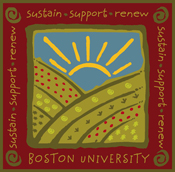Dinner gets fresh
Dining Services dishes up fare from local farmers

We rarely think about the origin of the food we eat and the many thousands of miles it has traveled to arrive on our plates. To ensure its freshness along the journey, producers routinely load food with additives and preservatives that can have harmful effects on our health. With the goal of providing the Boston University community with the freshest and most flavorful food possible, the Office of Dining Services has begun buying organic and local produce from area farmers, which cuts down on the food’s travel time and the amount of preservatives needed.
Beginning on move-in weekend, the dining halls have been serving locally grown products, including tomatoes, peppers, summer squash, zucchini, nectarines, alfalfa sprouts, apples, tofu, and yogurt. Dining Services plans to expand this effort as other foods come into season and is looking into buying local fish, honey, milk, and peanut products.
“Native tomatoes are much better than California tomatoes. Local foods have a higher quality because they are not traveling as far,” says Bruce Perry, director of operations for Dining Services. “Local products are now used in our recipes wherever possible; they are at the salad bar and are available in the vegetable section.”
The goal is to have between 5 and 10 local products available in the dining halls every day. These foods are distinguishable from the others because they bear a logo that reads “Sustain, support, renew.” Such products are called sustainable because purchasing local produce supports local farmers and the lands they farm. The food comes from within a 350-mile radius of BU and includes farms in Massachusetts, Maine, Vermont, New Hampshire, Rhode Island, Connecticut, New York, and New Jersey.
Joan Salge Blake, a Sargent College clinical assistant professor of nutrition, says that the difference between locally grown food and food that has be imported from across the country is noticeable. “There isn’t anything more delicious than a locally grown apple,” she says. “One bite into a juicy, sweet fall New England apple will remind you that Mother Nature has made nutrition absolutely delicious.”
BU Dining Services works closely with two companies, Costa, of Charlestown, Mass., and Sid Wainer & Son, of New Bedford, Mass., to ensure that the University is supplied with a variety of fresh local products on a daily basis.
“Produce is 90 percent water. The faster it’s transported with the absolute maintenance of the cold chain the better the guarantee that the students of Boston University will consume the freshest, healthiest produce in today’s marketplace,” says Henry Wainer, president of Sid Wainer & Son, whose company not only distributes the produce, but also grows it on four company-owned farms. “Products that come from distant destinations are subject to deterioration based on dehydration and age.”
Students benefit if the dining halls can provide food that is not only healthy, but also delicious, says Salge Blake. “Seasonal produce, grown locally, typically has superior flavors,” she says. “People don’t eat nutrients. They eat food, so if the nutrient-rich fruits and vegetables served in the cafeteria are deliciously tasty, the students will eat more of them.”